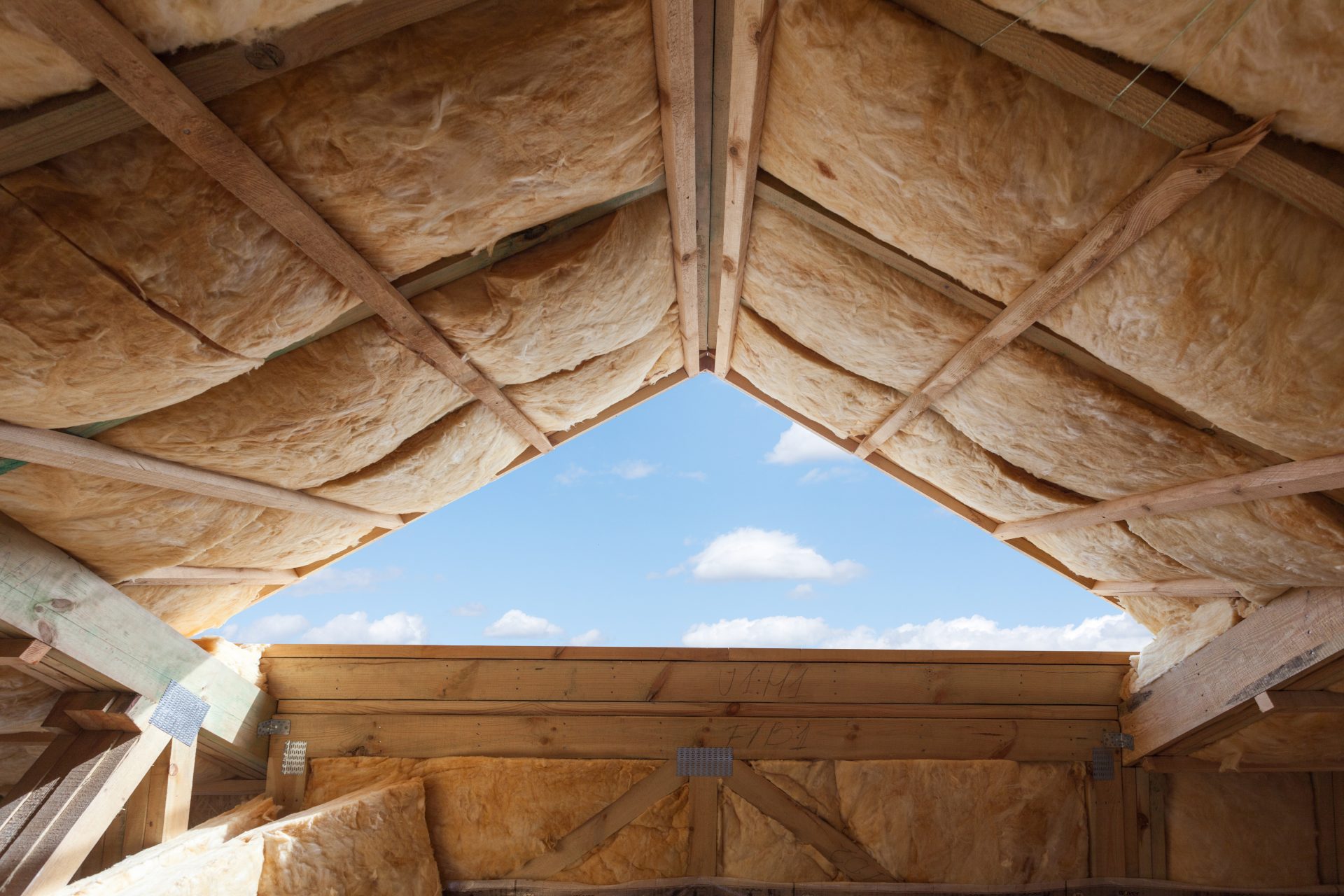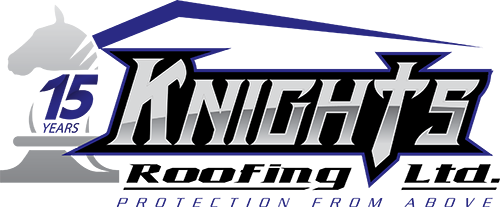Are the cold hands and feet back already? As the summer heat is on its way out, more time spent indoors means we are aware of things going on at home. Drafts and high energy bills this early in the season are a warning sign for a cold winter ahead, but it doesn’t have to be like that. Roof insulation is one of the most common causes of colder homes, and it is becoming a more valuable investment in your home as the weather shifts. Whether you are deciding to insulate a new build or it’s time to consider replacing your roof’s insulation, our team at Knights Roofing is here to help you get the most out of your roof maintenance this year. Read on to learn the 7 benefits of insulating a roof.
4 Signs your roof insulation needs to be replaced
Over time, your roof insulation will start to deteriorate due to several factors, including exposure to the elements, where it is located, the quality of installation, and if it has been compromised. Your roof insulation should be checked at least every 10 years. The older the insulation, the more prone it is to leaking after months of rain or heavy snow. If you can’t remember the last time you checked your roof insulation, let’s talk about indicators that it is time to call in help.
Draftiness in your home: Feeling a draft from the entryway or windows in your home during colder months is normal, but feeling a draft when you move throughout the house? Not so much. When in doubt, check for drafts coming from the attic or crawlspace. These drafts can be a sign that your insulation is nearing the end of its life and needs to be replaced.
Increased costs for heating and cooling: With an increase in energy costs across Alberta, we are all looking for ways to reduce our energy bills this year. When insulation starts to deteriorate, heat can escape through the insulation, which will require you to up the heat in your home each winter. An energy audit can show you where the heat is escaping from and where your insulation is not up to code.
Water damage: Ice dams and water leaks from constant freezing and thawing in Alberta are uncommon, but they can do a number on your insulation. If your insulation has been repeatedly soaked, there is a higher risk of mould and mildew developing. When left untreated, this can greatly impact your respiratory health and should be replaced immediately.
Signs of pests: As colder weather becomes more frequent, it’s time to look for any unwanted house guests making a home in your insulation. Look for signs of urine or feces left behind in your insulation and any gaps they may have used to get inside your home.
Do any of the following relate to your home? It’s time for an upgrade. At Knights Roofing, we believe in protection from above and finding solutions to make your home ready for anything. To help you make an informed decision when replacing your roof insulation, we have a few recommendations and tips to help you better understand your roofing needs.
7 Benefits of Insulating a Roof
- Become more energy efficient: As energy bills continue to rise across Alberta, insulating your roof can help you save money this winter. If you are in the process of replacing your furnace or hot water tank, extra steps taken for insulating your home can also mean you are eligible for federal energy rebates. You can monitor and better control your room temperature without relying solely on your AC or heater.
- Improve your heat retention and prevention: Did you know that insulating your roof can benefit you in every season? Not only can you prevent heat from escaping your home in the winter months, but you can also help to keep the house cool in the summer as heat cannot easily penetrate the insulation.
- Create a usable space: How could you benefit from having an additional storage space in your home? Taking the steps to insulate your roof will allow you to keep the attic at room temperature, thereby opening up the potential for additional room or storage nooks.
- Increase the value of your home: The time spent renovating and updating your roof’s insulation will not only save you money but will also increase the value of your home should you decide to sell as it will be appealing to new buyers in the area.
- Protect the unseen: Let’s be honest, how often do you actually think about your roof? As the most unseen part of your home, roof insulation can help to better protect against the elements. You are taking steps towards preventing damage caused by ice dams, condensation, and moisture. To learn more about winter roof damage, check out our 5 essential tips to prevent winter roof leaks.
- Become more environmentally conscious: By spending less on the amount of energy you are consuming each month, you would be taking steps towards lowering your carbon footprint and reducing your yearly emissions.
- Spot roof issues faster: We are no strangers to heavy snowfall in Alberta, but signs of no snow on your roof in the dead of winter should be an indicator of heat loss. Through preventative protection and maintenance, you will be able to jump on signs of roof damage early.
What Does the R-Value Represent in Roof Insulation?
If you have ever walked through the hardware store and looked at insulation for your home, you have probably come across the printed R on each material. The R-value represents a material’s resistance to conductive heat flow, or more specifically, how well it stops heat from escaping. As a rule of thumb, the higher the R-value, the more effective it will be in your home. In Canada, the insulation used in your wall will not have the same R-value as that of your roof as heat rises and is more likely to escape through the roof. The thickness and density of insulation help to determine the R-value of a material and should be considered when choosing your insulation.
Take note of the recommended R-value for your home and for the climate that you live in. Different parts of Canada and Alberta will have different recommendations based on building codes. But don’t overdo it – if you choose an insulation with a higher R-value than is recommended, it will limit the ventilation in your attic and impact the flow of air throughout your home.

What roof insulation material is best for my home?
There are a variety of insulation options available to you, but your choice may depend on the structure of your home and the purpose. Let’s take a look at the most common types of insulation in Canada.
Spray Foam: This type of insulation is designed to seal cracks, block moisture and insulate roof decks, slates or tiles. Spray Foam is typically used in smaller applications due to the higher cost and is not recommended for DIY applications.
Batt Insulation: One of the most common types of roof insulation is batting. Made up of fiberglass, batt insulation does not seal in the same way that spray foam does, but it can be more easily cut and fit around ceiling joists and rafters. As a low-cost solution, it is also moisture-resistant, making it a good choice for spaces that are typically left alone for long periods.
Blown-in Insulation: If you are looking to insulate a larger space, blown-in insulation is your best choice. Made of a mixture of cellulose, fiberglass, and recycled materials, opting for blown-in insulation will give you more freedom to control the amount of insulation you want in your attic space based on your climate. In colder climates like Alberta, blown-in insulation will not offer the same level of heating in your home.
Structural Insulated Panels: Looking for insulation for a new build? Structural insulated panels are designed for durability for new building projects and are certified as an energy-efficient choice for your home. Due to their inflexible nature, this is not the best option for existing structures as it is not easy to retrofit.
Rigid Insulation Boards: Made of hardened foam plastic that has been formed as a sheet, rigid insulation boards can be used on your roof, attic, or foundation walls and are easy to cut and manipulate for your space. Many of the boards are designed with a foil layer for extra heat resistance but are recommended more for foundational use.
According to the Canadian Insulation Building Codes, the recommended R-value for roof insulation falls between R-55 and R-60. When insulating your home, the best insulation type is determined by the structure of your roof, your budget, and the climate you live in.
On average, the cost of insulating your roof for a 2000-square-foot home is between $1500 and $2500. The cost is determined by your roof size, the material type, labour, accessibility, and any additional cleaning or repairs.
Selecting your roof insulation
Our qualified team of experts can help you find the best material for your home and needs. When selecting your insulation, consider the following checklist:
- Does it prevent radiant heat transfer?
- Will it stop condensation?
- Is it impacted by humidity?
- How easy is it to install?
Once you choose your roof insulation materials, you can sit back and relax and leave the installation to us. Our crews will determine if any additional repairs are required for your roof or attic space before installation and will work diligently to get the task completed on time and within budget.
How do I book a service?
Are you ready to upgrade your roof insulation? Working with a professional roofing company can save you money and time as teams of dedicated experts can spot problems early and provide quality recommendations for your roof. At Knights Roofing, enjoy protection from above with quality workmanship you can trust. Get your free estimate today for your roof insulation or contact us to see how we can help support your residential roofing needs!
